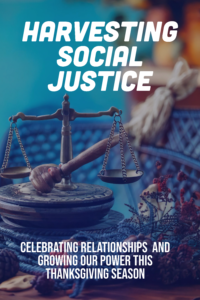How does Supremacy Culture Use Thanksgiving?
Supremacy Culture seeks to disempower individuals in order to maintain its own power. Relationships, however, are portals to power—either reciprocal or extractive. This brings us to the holiday of Thanksgiving in the United States: what does it invite us to celebrate and build?
On the surface, Thanksgiving encourages connection with family. Yet, it also centers and normalizes the patriarchal notion of the nuclear family as the ideal unit. Friendsgivings offer a contrasting performance, creating space for chosen families, but they often remain secondary to the dominant narrative of family gatherings.
Traditional Thanksgiving celebrations can also highlight challenges within modern family dynamics. Families may struggle to gather due to smaller home sizes or geographic distance. When they do, hierarchical tensions often emerge—such as competition over who hosts the dinner—sometimes turning the holiday into a source of division, strife, and stress that exacerbates precarious relationships.
The holiday also encourages us to lie to one another, promoting the “peace” of supremacy culture that reinforces white supremacist, ableist, heteropatriarchal systems. It asks us to ignore the ongoing genocide of Indigenous peoples and the realities of colonization. In addition, the holiday reflects capitalist values of overconsumption, emphasizing the performance of abundance through overindulgence. This is immediately followed by Black Friday, a day dedicated to consumerism, further reinforcing cycles of excess.
So, how do we reimagine Thanksgiving as a holiday centered on liberation?
We can start by redefining how we connect with others. Instead of focusing on a single family meal, aim to connect with as many family units as possible. If distance prevents physical gatherings, use phone calls or virtual means to stay in touch. Participate in multiple meals or gatherings if feasible—bringing an appetizer to one, a side dish to another, and dessert to the last. This approach diversifies and deepens relationships without relying on overconsumption or the performative display of bounty.
We can also educate ourselves and use the day to discuss important topics like the histories and futures of Indigenous peoples, the landback movement, reparations for Black communities, and ongoing issues of colonization, such as in Palestine. These conversations can transform the holiday into an opportunity for truth-telling and awareness.
Additionally, consider engaging in social justice work or community service. Volunteering can honor the values of connection and generosity in a more meaningful way. Alternatively, prioritize rest and reflection, strengthening your relationships with yourself, your loved ones, and your broader community.
By shifting our focus, Thanksgiving can become a day of genuine connection, healing, and liberation—transforming it from a celebration of excess to a celebration of resilience, reciprocity, and justice.

